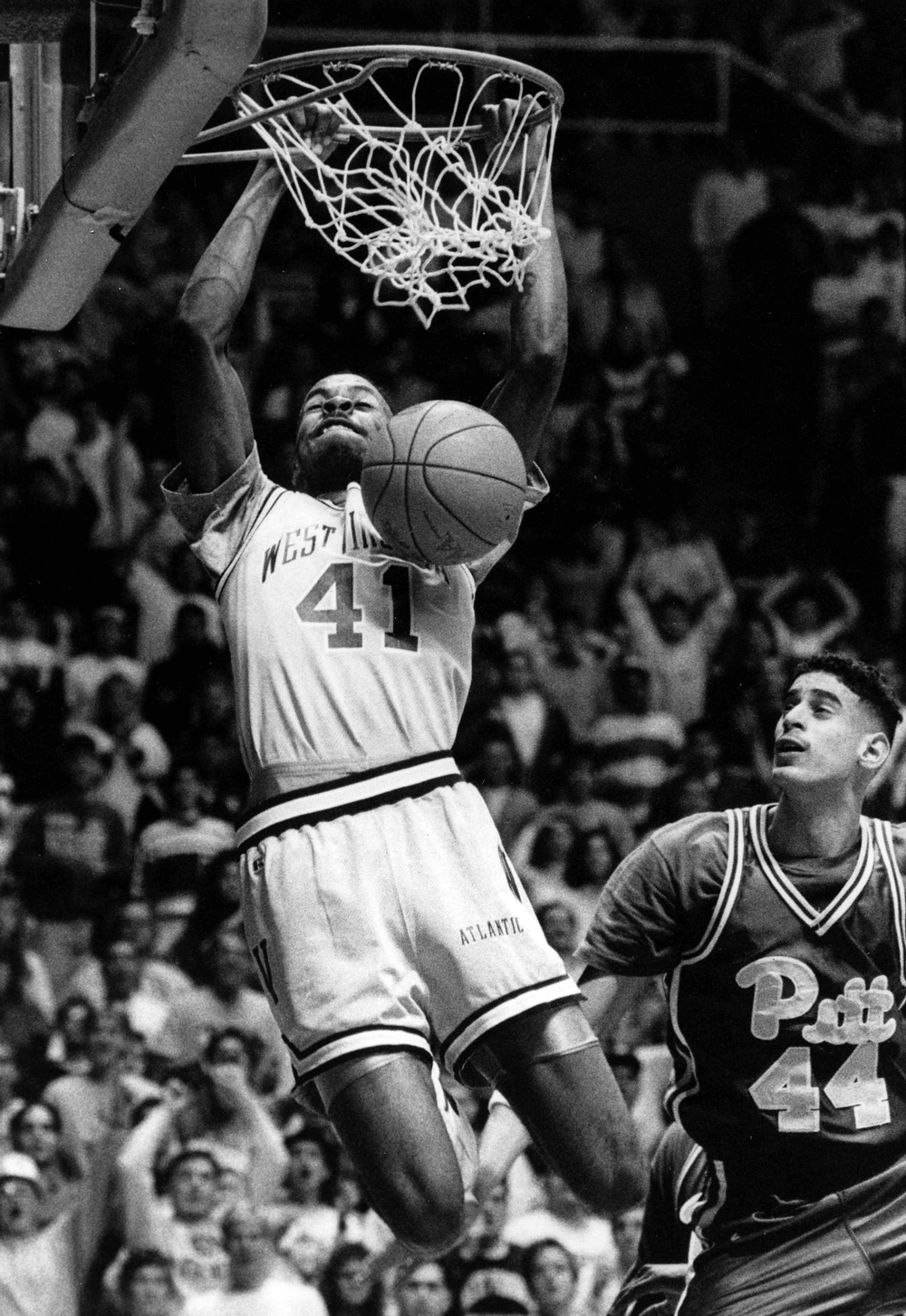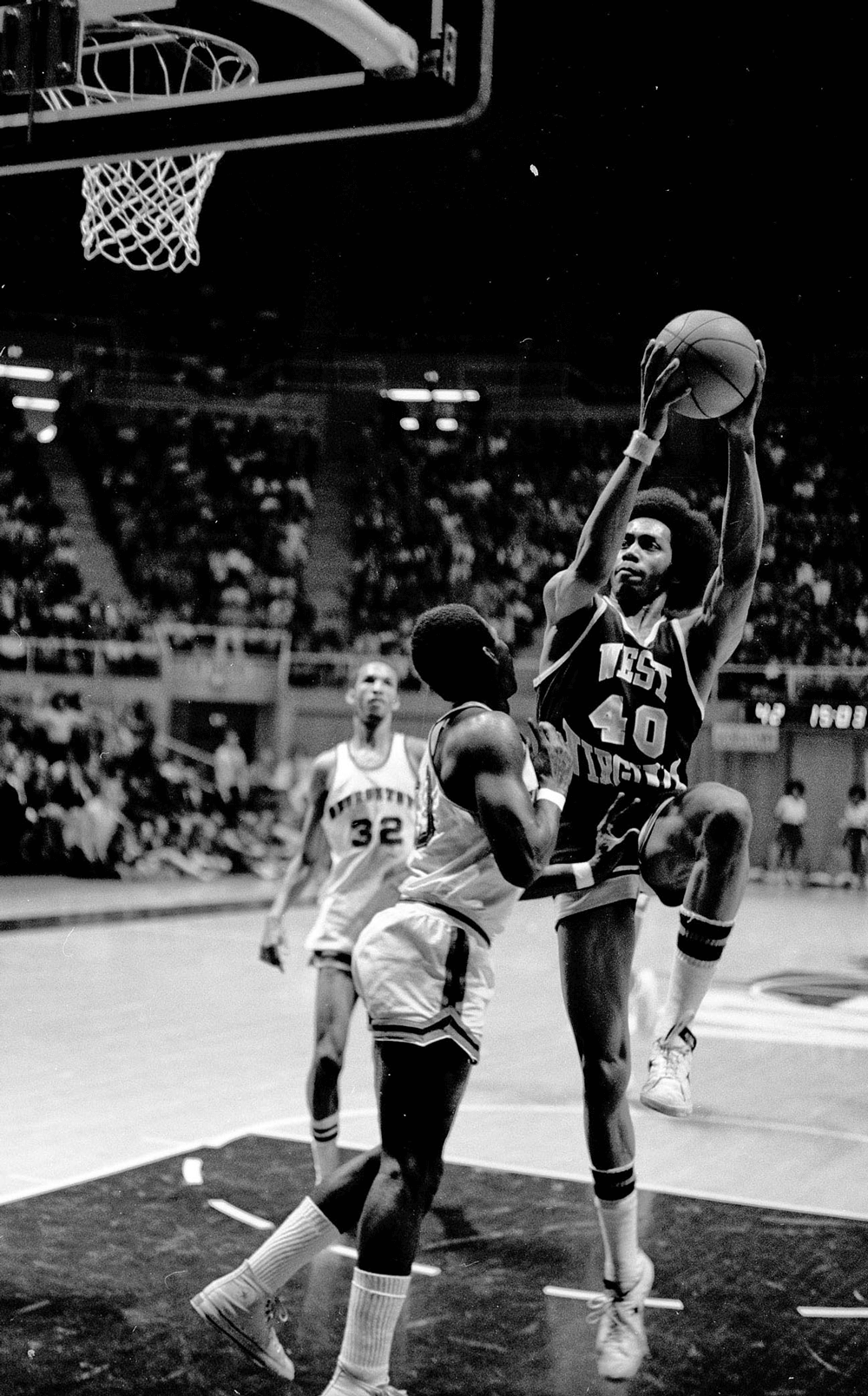Any discussion about the 50 greatest West Virginia University players to play in the WVU Coliseum must start with guard Wil Robinson.
No Mountaineer has come close to matching Robinson’s prodigious scoring rate during his two brilliant seasons playing in the arena in 1971 and 1972.
The Uniontown, Pennsylvania, native tallied 838 points in just 28 games in the Coliseum, which averages out to 29.93 points per contest!
Second on the list is guard Stan Boskovich, who averaged 18.64 points in 28 Coliseum games, followed by guard Tony Robertson’s 18.43 points, also in 28 games. All-Big East forward Calvin Bowman was fourth, averaging 18.19 points in his 16 Coliseum appearances.
Those other guys could score, for sure, but Robinson was on a completely different level.
“What I remember most about Wil is you knew he was going to drive right and you still couldn’t stop him,” Coach Bob Huggins recently recalled. Huggs transferred to WVU the year after Robinson graduated in 1972 and played against him a lot during the summer.
Of the best-ever Western Pennsylvania prep players, Wil Robinson is probably one of the most underrated and underappreciated because he chose to attend West Virginia instead of staying home to play at either Pitt or Duquesne.
You can go back and research the Pittsburgh Press or the Pittsburgh Post-Gazette during Robinson’s three-year career at West Virginia in the early 1970s and there is hardly any mention of him in the two city papers, other than that he once played at Laurel Highlands and led them to the 1968 state championship.
Robinson was the first player in Laurel Highlands history to earn AP all-state honors for all classes that year, joining Ambridge’s Dennis Wuycik and Philadelphia’s Craig Littlepage on the first team.
Making third team that year was Mansfield’s Tom McMillen, who later starred at Maryland.
In 1991, Post-Gazette high school writer Rick Shrum listed Robinson as one of the 15 greatest Western Pennsylvania high school players, joining the likes of Norm Van Lier, Kenny Durrett, Wuycik, Billy Knight, Maurice Lucas, Brad Davis, B.B. Flenory, Sam Clancy and Bruce Atkins (notice all of the Pitt and Duquesne players on the list?).
This is what Shrum wrote about Robinson, “… a streak shooter whose hot streaks were remarkable. Even when missing 20-footers, Robinson, 6-2, had the quickness and leaping ability to score inside and rebound. He had two excellent complements in Jim Hobgood and Buzzy Harrison, but Laurel Highlands would not have won the 1968 state title without Robinson, who was a big scorer at West Virginia.”
That’s far more than the Post-Gazette’s Al Abrams, Marino Parascenzo or Charley Feeney ever wrote about Robinson, or the Press’ Roy McHugh, Russ Franke and Phil Musick did during Robinson’s WVU career.
Wil was simply crossed off once he crossed the state line, which demonstrates the degree of pettiness the Backyard Brawl reached during that time period.
“The honest to God truth is they were all pissed up in Pittsburgh,” Robinson recalled, laughing. “They thought I was going to go to Pitt or Duquesne. They were really, really upset at me for coming down to West Virginia.”
Robinson said his three final college choices at the time were West Virginia, Duquesne and Michigan State.
Pitt, in the late 1960s, was not a very good athletic program and was second fiddle in basketball to Duquesne in the city. Robinson was also recruited heavily by Kentucky and the Wildcats wanted him to be the first Black player in program history, but Robinson wasn’t too interested in playing for Adolph Rupp.
“Rupp sent one of his assistants to my home in Uniontown, and I will never forget it. I told my dad, ‘No, I can’t be the first one going down there.’ Not too many people know about that because I don’t bring it up,” Robinson remembered.
It took Kentucky three more years before 7-foot-2 center Tom Payne finally integrated the Wildcat program during Robinson’s junior season at WVU in 1971.
West Virginia was a little ahead of the curve at the time in that regard with Ron “Fritz” Williams, Jimmy Lewis, Ed Harvard, Norman Holmes and junior college forward Carl Head integrating the Southern Conference in 1966.
Young Mountaineer coach Bucky Waters used Williams’ success at WVU to make an impression on Robinson.
“I did like Bucky, but his main recruiter for me was Ron Williams,” Robinson recalled. “He sent Ron Williams to my house just about every week. I wasn’t really that tight with Bucky. I knew he was considered a good, young coach at that time, but he was really recruiting me through Ron. I liked Ron and what he was telling me about West Virginia.”

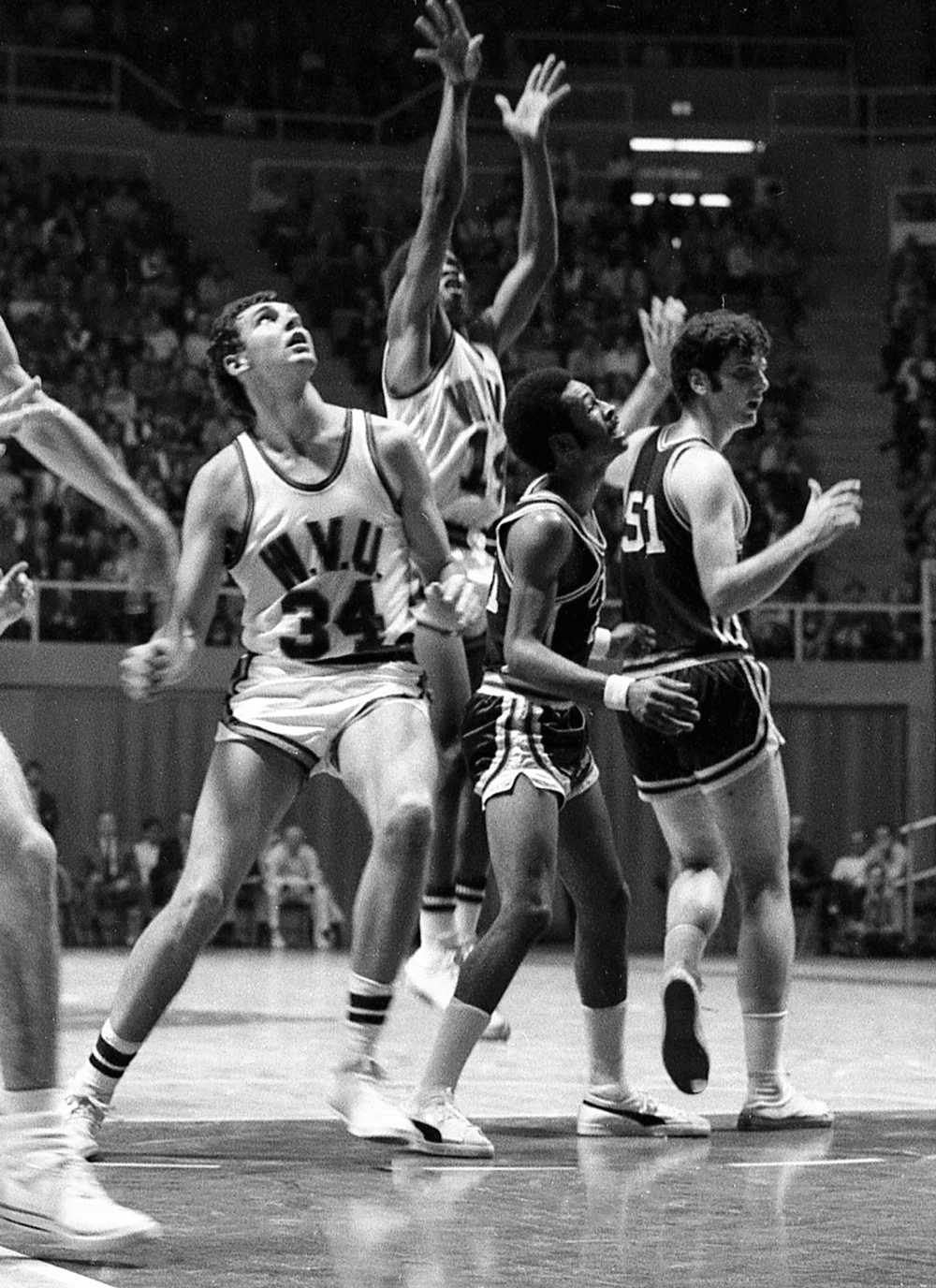
Robinson and Charleston’s Curt Price were prep All-Americans who were supposed to be the two building blocks for the Mountaineer program when they opened the new WVU Coliseum in 1971.
Waters left for Duke soon after signing Robinson and Price, but his replacement, Sonny Moran, continued adding good players. Charleston High’s Levi Phillips and Larry “Deacon” Harris followed Price to WVU, junior college forward Sam Oglesby came to West Virginia giving the Mountaineers an athletic rebounder and WVU also finally found a competent center in 7-footer Mike Heitz from Garrett, Indiana.
By 1972, Moran and his assistant coaches, Gary McPherson and Chuck Windsor, had the program right where they wanted it. Retiring athletic director Red Brown cashed in all of his favors to convince the NCAA to bring the East Regional to Morgantown that year, and Moran felt he had a team good enough to play in it.
West Virginia began the year by winning its first six games, knocking off NC State and Davidson, to return to the Top 20 for the first time since the early 1960s.
Then tragedy struck.
Phillips and Harris were ruled academically ineligible in December. Despite having passing grades, they had not taken enough courses in their majors, and then Harris was killed and Oglesby paralyzed in a tragic auto accident in January.
Backups Bob Hornstein and Gary Reichenbacher were also lost for the year because of injuries.
That would be about the equivalent of this year’s team losing Taz Sherman, Derek Culver, Emmitt Matthews Jr., Jalen Bridges and Gabe Osabuohien and being left with only Deuce McBride to do the scoring.
That’s basically what happened to Wil Robinson during his senior season.
“That was the biggest disappointment in my career at West Virginia,” Robinson admitted. “It was devastating because the guy who got killed in the car wreck, Larry Harris, was my roommate. It was terrible.
“At the time when all of that happened, I don’t think people realized my full potential as a player,” he continued. “People just thought all I could do was shoot, shoot, shoot. Well, before all of that happened, I was only averaging about 22, 23 points per game because Levi, Sam, Larry and Mike were all averaging double figures. It all balanced out.”
By the end of January, Robinson was one of just seven healthy players left on the team and the only one who could consistently score.
From Jan. 26 until the end of the regular season, Robinson scored 41 against Virginia Tech, 39 against Notre Dame, 37 against Navy, 40 versus Virginia, 31 against William & Mary, 45 against Furman, 41 including the game-winner against Manhattan, and 42 versus Pitt in his final Mountaineer appearance.
He averaged 32.5 points over his final 13 games – easily more than any other player in school history, including the great Jerry West.
After watching Robinson score 37 in an 84-81 win over Navy, a sportswriter asked Midshipmen coach Dave Smalley what he would have done differently to try and slow down Robinson.
“Get a gun and shoot him,” he answered.
Back then, West Virginia played Notre Dame on a yearly basis and Robinson’s shootouts with Irish All-American guard Austin Carr were legendary.
During Wil’s junior year, in 1971, the two put on a show in the Coliseum with Carr scoring an arena-best 47 points and Robinson tallying 30.
“Curt Price guarded Carr that game,” Robinson joked.
The following year, with Carr off to the NBA, Robinson lit up the Fighting Irish for 39 in a 97-87 road victory. The team rallied to win its final three games of the season against Manhattan, Virginia Tech and Pitt to finish with a 13-11 record.
It could have easily been 20-4 had the wreck and academic suspensions not happened.
Robinson set the single season scoring record, eclipsing West’s scoring average by .13 points, 29.42 to 29.29 in 1960. Robinson said if not for Curt Price, he wouldn’t have gotten the record.
He found out later that Moran was going to take Robinson out of the game when the Mountaineers were comfortably ahead, but Price refused to go back in because he wanted Wil to break Jerry’s record.
“I didn’t know that until Curt told me,” Robinson said.
Robinson is still fourth in career scoring at WVU with 1,850 career points, and his 24.67 scoring average in 75 career games is second only to West’s 24.83 average. Just being that close to one of the NBA’s all-time greatest players demonstrates how tremendous Wil Robinson was as a college player.
“He was so explosive,” Huggins recalled. “He released his shot where 6-10, 6-11 guys released their shot. He had such great bounce … and was such a good guy. Wil is a really, really good guy.”
“I look back at my life, I’m from Uniontown and I grew up in Pittsburgh, and some of my closest friends are from West Virginia,” Robinson admitted. “I’m 71 years old, and I have more friends from West Virginia right now than I do any other place.”
Robinson, now retired, lives just north of Buffalo in Grand Island, New York.
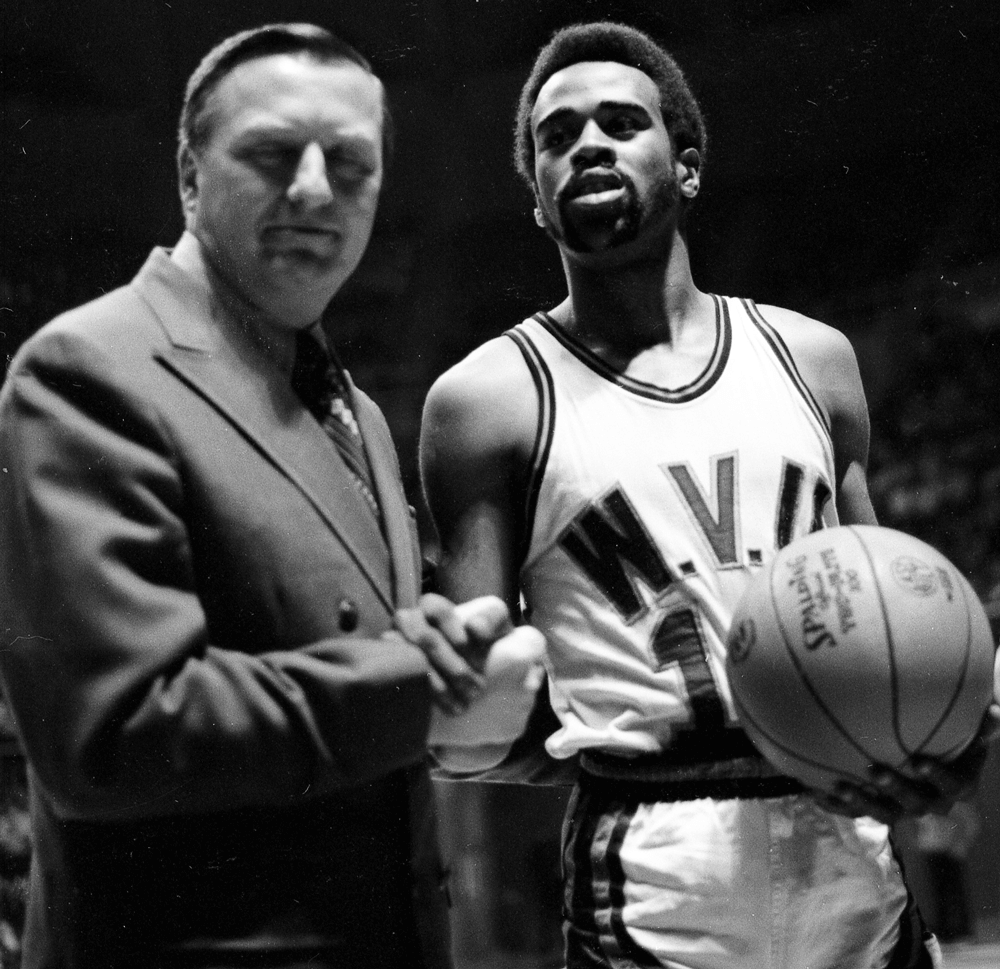
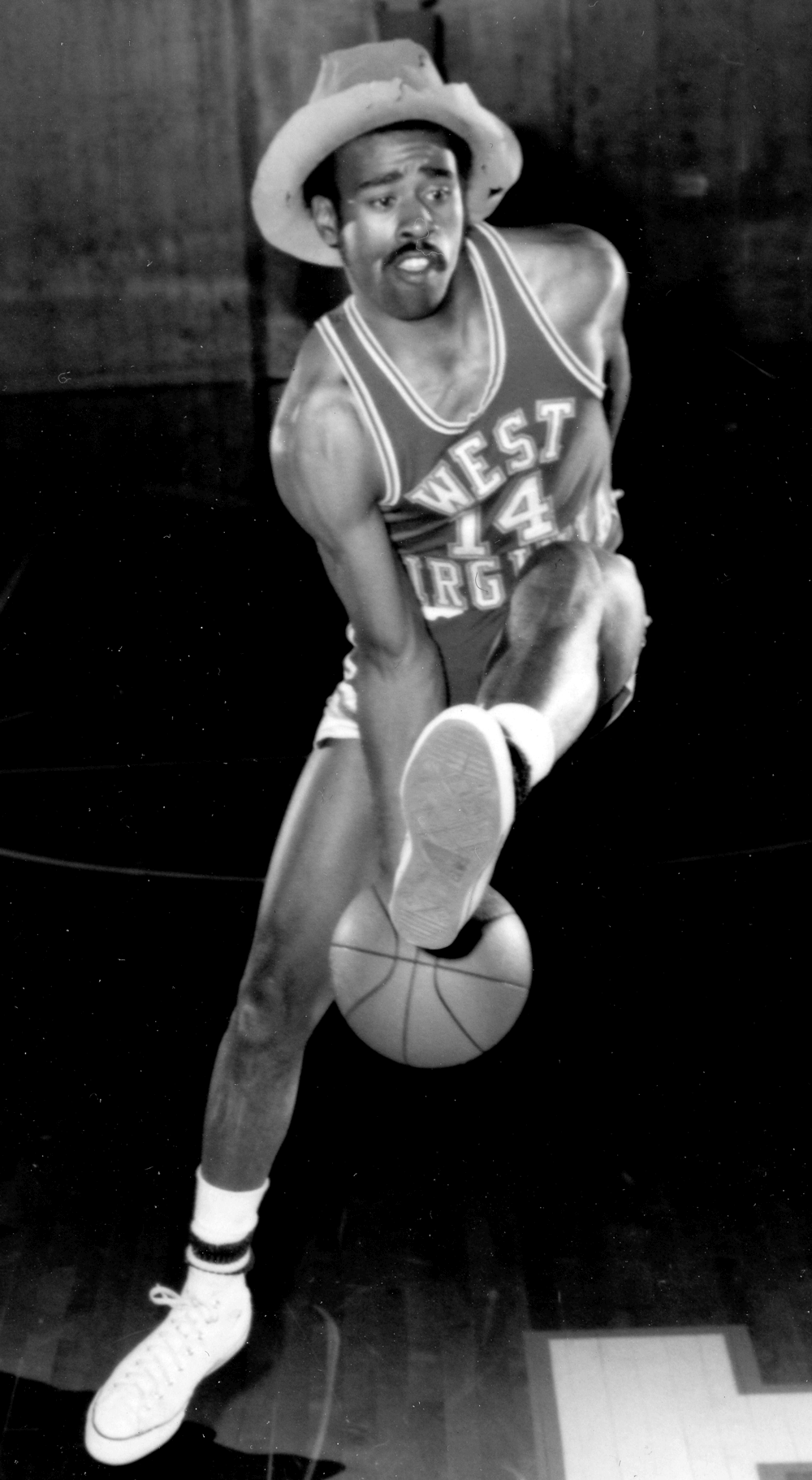
Top 5 WVU Coliseum Scorers
1. Greg Jones, 917
2. Da’Sean Butler, 879
3. Pervires “P.G.” Greene, 854
4. Warren Baker, 839
5. Wil Robinson, 838
Top 5 WVU Coliseum Scoring Averages
1. Wil Robinson, 29.93
2. Stan Boskovich, 18.64
3. Tony Robertson, 18.43
4. Calvin Bowman, 18.19
5. Drew Schifino, 15.03
5. Eron Harris, 15.03
Top 50 Players in WVU Coliseum History (Minimum two full seasons)
Joe Alexander
Jerome Anderson
Warren Baker
Marsalis Basey
Steve Berger
Dale Blaney
Stan Boskovich
Calvin Bowman
Mike Boyd
Chris Brooks
Herbie Brooks
Truck Bryant
Da’Sean Butler
Jevon Carter
Derek Culver
Devin Ebanks
D’or Fischer
Mike Gansey
Marcus Goree
Pervires P.G. Greene
Johannes Herber
Seldon Jefferson
Greg Jones (1980-83)
Kevin Jones
Sagaba Konate
Chris Leonard
Gordon Malone
Joe Mazzulla
Daxter Miles Jr.
Lowes Moore
Chris Moss
Darris Nichols
Damian Owens
Jaysean Paige
Tarik Phillip
Kevin Pittsnogle
Darryl Prue
Tony Robertson
Mo Robinson
Ricky Robinson
Wil Robinson
Lester Rowe
Alex Ruoff
Drew Schifino
Tyrone Shaw
Tracy Shelton
Juwan Staten
Russel Todd
Devin Williams
Frank Young


